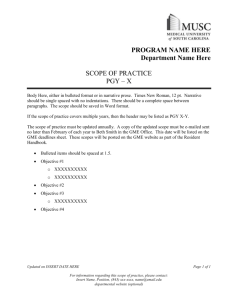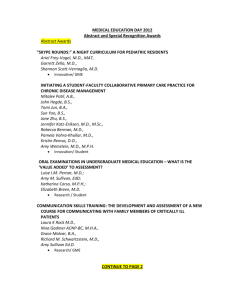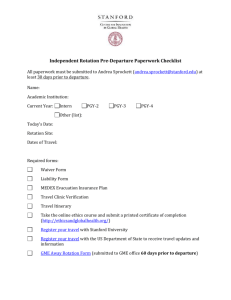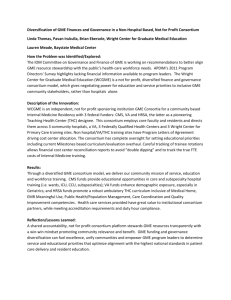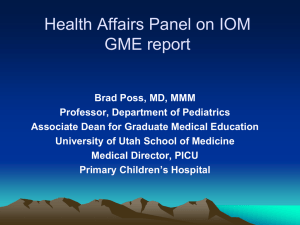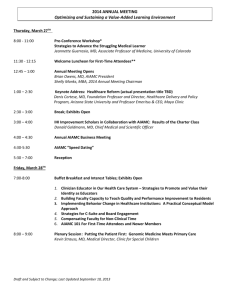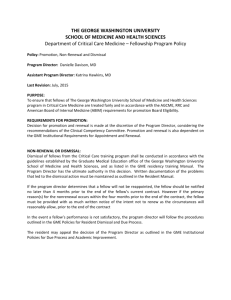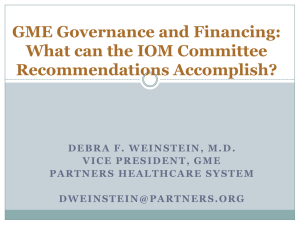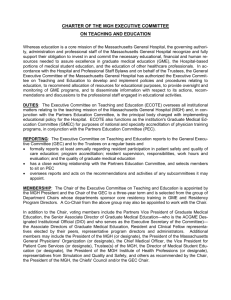305 - American Medical Association
advertisement
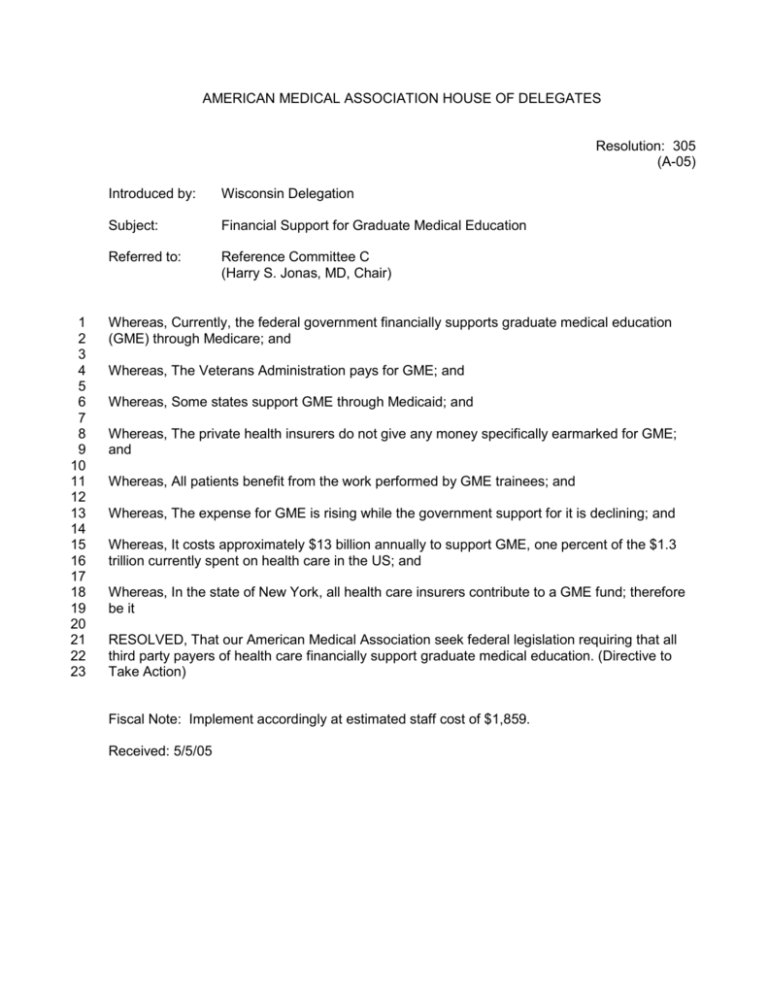
AMERICAN MEDICAL ASSOCIATION HOUSE OF DELEGATES Resolution: 305 (A-05) 1 2 3 4 5 6 7 8 9 10 11 12 13 14 15 16 17 18 19 20 21 22 23 Introduced by: Wisconsin Delegation Subject: Financial Support for Graduate Medical Education Referred to: Reference Committee C (Harry S. Jonas, MD, Chair) Whereas, Currently, the federal government financially supports graduate medical education (GME) through Medicare; and Whereas, The Veterans Administration pays for GME; and Whereas, Some states support GME through Medicaid; and Whereas, The private health insurers do not give any money specifically earmarked for GME; and Whereas, All patients benefit from the work performed by GME trainees; and Whereas, The expense for GME is rising while the government support for it is declining; and Whereas, It costs approximately $13 billion annually to support GME, one percent of the $1.3 trillion currently spent on health care in the US; and Whereas, In the state of New York, all health care insurers contribute to a GME fund; therefore be it RESOLVED, That our American Medical Association seek federal legislation requiring that all third party payers of health care financially support graduate medical education. (Directive to Take Action) Fiscal Note: Implement accordingly at estimated staff cost of $1,859. Received: 5/5/05 Resolution: 305 (A-05) Page 2 RELEVANT AMA POLICY H-305.956 Financing Graduate Medical Education (1) Efforts to reform graduate medical education (GME) financing should focus solely on the methods of financing the direct costs of GME. (2) The financing of GME should continue to be linked to the financing of patient care services. (3) All third party payers should participate explicitly and in a uniform way in the financing of GME. The AMA should take the lead in convening a meeting of interested parties with the purpose of resolving this issue (Reaffirmed by Sub. Res. 706, I-94). (4) CMS should be urged to revise the regulations governing Medicare direct medical education payments to eliminate the extraordinary variation in GME costs claimed by teaching hospitals. (5) The procedures used by the ACGME residency review committees and the Specialty Boards for adding new specialties and those for extending the length of training required for certification in existing specialties should be reviewed. The AMA should take the lead in convening a meeting of interested parties with the purpose of resolving this issue. (6) Our AMA urges the Secretary of the Department of Health and Human Services to develop a system to obtain annual information on per-FTE-resident costs to hospitals and non-hospital settings to be used for purposes of determining direct GME payments. (7) Our AMA supports a technical amendment to the Balanced Budget Act of 1997 which would change the cap on residents from those "in the hospital" to those "in the program" during the statutory reporting period. (CME Rep. G, I-92; Reaffirmed: CMS Rep. S, A-93; Reaffirmed by CME Rep. 5, A-97; Reaffirmed and Appended: BOT Rep. 5, I-98) H-165.897 Health Care Reform Proposals Neglect of Financing Medical Education and Research (1) Our AMA will work with the medical education community to ensure that attention is given by federal and state policymakers to the need for maintaining adequate funding for medical education. (2) The following areas should be given priority in planning for financial support: (a) providing graduate and undergraduate medical education in ambulatory care settings in the community, and assuring the availability of adequate supervision for trainees; (b) preserving the potential for educational innovation and the possibility of future change in curriculum and student/resident evaluation; (c) preserving an appropriate mix of qualified generalist and specialist faculty to serve as supervisors for medical students and residents; and (d) increasing the opportunities for primary care faculty members to participate in research. (3) The following should be considered as means to provide financial support for medical education: (a) Create an all-payer funding pool for graduate medical education (GME) and ensure that funding for GME is distributed to the entity that incurs the costs, that is, the sites responsible for the training of residents in accredited residency programs. Funding mechanisms should also facilitate the linkage of undergraduate and graduate medical education, for example in the ambulatory care setting. (b) Develop a federal funding pool to support educational innovation at individual medical schools. The funds could be distributed on a competitive basis, through grants or contracts. (CME Rep. 5, A-94; Reaffirmed by CME Rep. 1, I-96) H-305.935 Policy Options for Support of Graduate Medical Education Our AMA adopts the following principles: GME POSITIONS (1) Planning for the number of residency positions should take into account the contributions to patient care made by other health professions and occupations, considering that other health professions and occupations do not substitute for physicians. (2) Explicit immunity from antitrust constraints should be provided to private professional groups, to allow participation in the national debate on the physician workforce. (3) Program quality, based on an assessment of educational program outcomes under the leadership of the Accreditation Council for Graduate Medical Education and its Residency Review Committees, should be a factor in the allocation of funded residency positions. FUNDING OF GME (4) The direct costs of graduate medical education should be supported through a Graduate Medical Education Trust Fund that receives contributions from all payers for health care. The private/public sector advisory body should study and develop mechanisms for the distribution of funding from this Trust Fund. (5) Financial support for residency training should be sufficiently stable to allow for meaningful planning. This requires a budgeting system that is not subject to an annual appropriations process. If a Graduate Medical Education Trust Fund is not established, funding for the direct costs of graduate medical education should remain within the Medicare program. (6) Budgeting for the direct costs of graduate medical education should be based on a per-resident amount, which should move toward comparability across locations. The direct costs of GME include resident salaries, supervisory costs, and educational program overhead. Regional cost differences should be taken into account. (7) Funding should follow residents to all educational sites. Any authorization, capitation, or "voucher" system should permit such distribution of funds to the sites that incur the costs of training. SUPPORT FOR THE MISSIONS OF TEACHING INSTITUTIONS (8) The indirect medical education adjustment (IMEA) through Medicare should be restored to a level that permits the maintenance of the education, research, and charity care missions of teaching institutions. This mechanism should be maintained until there are explicit alternatives to support the costs associated with higher acuity in teaching institutions and indirect costs associated with the presence of a teaching program. (9) Transitional funds should be provided to teaching institutions that lose residents as a result of cuts in the number of funded positions. (CME Rep. 10, A-99; Reaffirmed: CME Rep. 2, A-00; Modified: CME Rep. 2, I-03) See also: H-305.968 Medicare Direct and Indirect Medical Education Costs D-305.989 Reauthorization and Reversal of Proposed Funding Cuts to Title VII, Title VIII and the Children's Hospital's GME Programs D-305.992 Accounting for GME Funding D-305.998 Impact of the Balanced Budget Act of 1997 on Graduate Medical Education Funding in Non-Hospital Settings
